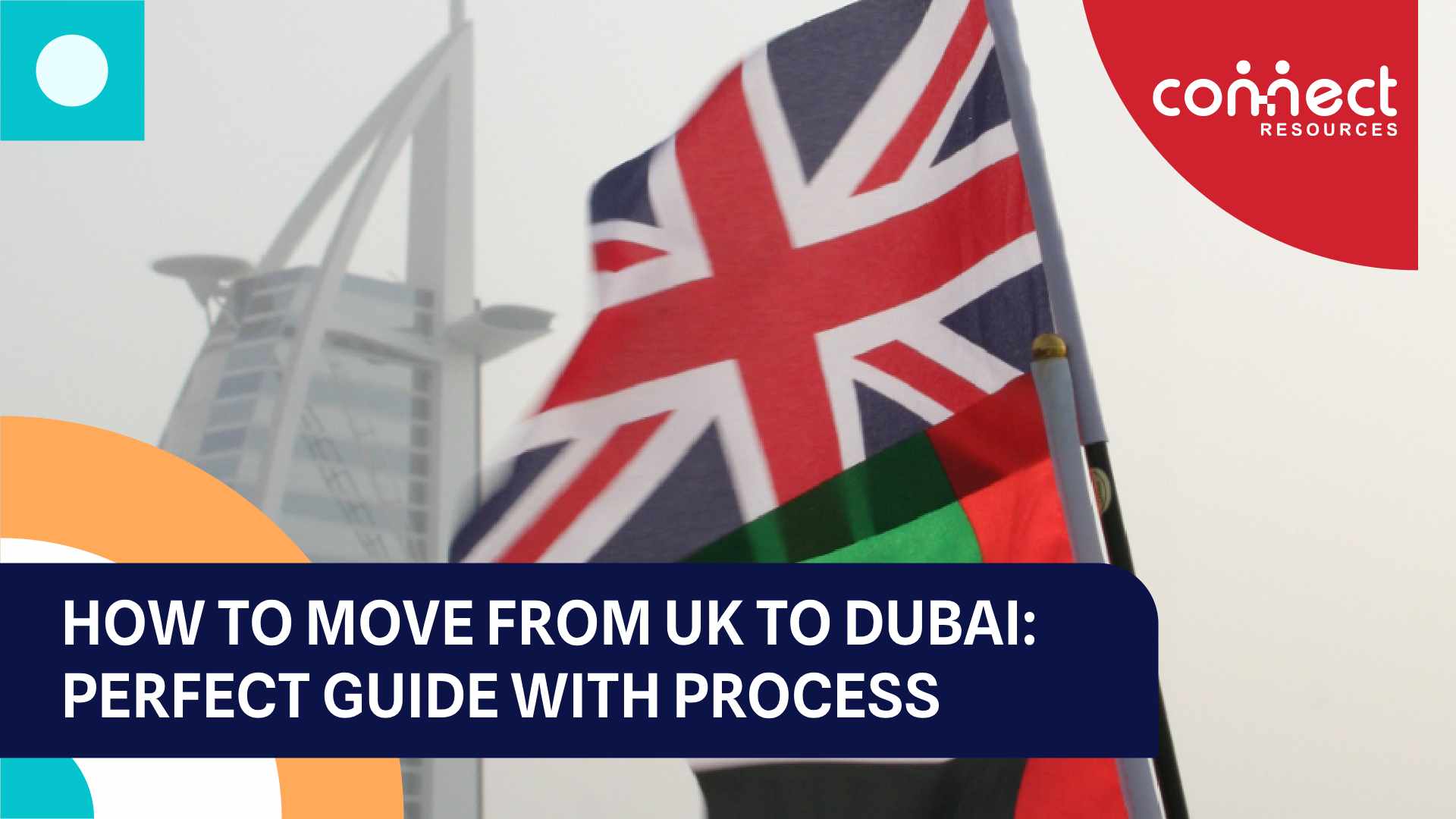Residents of the UK move to Dubai in search of improved work prospects and the chance to live opulent, sunny lifestyles. People are fascinated by this city of gold for a variety of reasons. Along with broad malls, a range of entertainment options, and stunning white beaches. There are several factors to take into account before moving to Dubai from UK.
In this article, we will be giving you all the details necessary for your relocating to Dubai from UK process. Moving to Dubai from UK can be challenging but thrilling. If you intend to relocate to Dubai from the UK, there are a few aspects you must be careful about in order to guarantee a successful transfer. Let us move on now!
Legal and Visa Considerations When Moving from the UK to Dubai
When moving to UAE from UK, it is important to consider the legal and visa implications of the move. In order to move legally, individuals must obtain a valid visa from the government of the United Arab Emirates. Additionally, it is important to understand the local laws in order to ensure that one’s actions do not violate any regulations. Furthermore, any contractual obligations in the UK must be settled prior to the move, and any debts must be settled in order to avoid legal repercussions.
In addition, it is essential to research the local job market before moving to Dubai. Potential employers may require certain documents to be presented in order to obtain a work visa and to apply for a residency permit. Moreover, depending on one’s chosen field of work, certain qualifications may be required in order to be eligible for certain positions. It is also important to consider the cost of living in Dubai, as this may influence one’s decision to move.
Document requirements and application process
Migrating between the UK and Dubai can be a complicated process, especially when it comes to legal and document requirements. It is important to understand the laws and regulations of the country you are moving to. As well as the application process required in order to complete the move.
Legal Requirements:
- If you are a British citizen, you will need a valid UK passport to enter Dubai.
- You will also need to obtain a visa before you travel. This can be done online through the Dubai General Directorate of Residency and Foreigners Affairs.
- You may also need to provide evidence of sufficient funds for your stay in Dubai.
- If you are planning to work in Dubai, you will need to obtain a work permit or labor card.
Document Requirements:
- Passport with a minimum validity of 6 months.
- Completed visa application form.
- Recent passport-sized photos.
- Proof of sufficient funds for your stay in Dubai.
- Documents proving employment status or educational qualifications, if applicable.
- Proof of address in the UK.
Application Process:
- Complete the online visa application form.
- Submit the required documents.
- Pay the visa fee.
- Collect your visa from the relevant visa office.
- Upon arrival in Dubai, you will need to complete the immigration process.
- You will need to register with the relevant authorities in Dubai and obtain a Resident Identity Card.
- You will also need to register with the Ministry of Labour if you wish to obtain a work permit.
Gathering the necessary personal identification
When moving from the UK to Dubai, the first step is to obtain a valid visa. Depending on the purpose of the move, there are a variety of visas available. To apply, you will need to provide relevant documents such as a passport, proof of residence, and proof of financial stability. It is also important to note that there are specific rules that must be followed when applying for a visa, such as the length of stay, the type of work to be done, and any associated fees.
Once a visa is obtained, it is important to apply for a residence permit. This document will be used to prove your legal residence in Dubai and will allow you to stay in the country for a longer period of time. You will need to provide proof of employment, financial stability, and other relevant documents in order to apply for the permit.
When it comes to the legal and document requirements when moving from the UK to Dubai, it is also important to consider the tax implications of the move. The UK and Dubai have different tax structures, and it is important to understand how this will affect your financial situation. You may also be required to submit certain documents, such as a tax return, to the relevant authorities in order to complete the transition.
Finally, it is important to keep in mind that the application process for moving from the UK to Dubai can be lengthy and complex. It is important to plan ahead and have all the necessary documents and information ready before submitting your application. Additionally, it can be helpful to seek professional legal advice to ensure that you are meeting all the requirements and making the most of your move.
Understanding Dubai’s visa types for UK expatriates
If you are planning to move to Dubai, it is important to be aware of the visa types available and understand the requirements.
The most common visa type for UK expatriates is the employment visa. This type of visa is obtained through sponsorship from a UAE-based employer. The visa is valid for up to two years, and can be renewed for up to three years. You will need to provide evidence of your qualifications, documents from your employer, and proof of income. It also requires a medical test and a police clearance certificate.
Those who are self-employed or running their own business can apply for a freelance visa. This type of visa is valid for up to one year and can be renewed for up to three years. To be eligible for this type of visa, you will need to provide evidence of your business activities, such as contracts or invoices. You will also need to provide a business plan and proof of income.
The residence visa is another option for UK expatriates who wish to stay in Dubai for an extended period of time. To be eligible for this visa, you will need to prove that you have a valid source of income in the UAE. This can include a job, business activities, or an investment in the country. The residence visa is valid for up to three years and can be renewed.
Lastly, there is the tourist visa, which is available to UK citizens for up to 90 days. This type of visa is ideal for those who are planning a short visit to Dubai. To apply for this visa, you will need to provide evidence of a return flight ticket and a valid passport.
Cost of Living When Moving to Dubai from the UK
Dubai is the ideal destination for foreigners looking for a new home. For those who want to move to Dubai from the UK, the city offers many prospects with a wide range of career options and a bustling cultural scene. The cost of living in Dubai is one of the main considerations for anyone thinking about a transfer.
Moving to Dubai from the UK could be an amazing chance to experience another aspect of life and culture. It is essential to consider the costs for residing in Dubai before doing so.
In contrast to the UK, Dubai typically offers lower overall living costs. Basic items like fashion, food, and furnishings cost less in Dubai than they do in the UK. Additionally, rents are 30% more affordable in Dubai than comparable areas in the UK.
Dubai’s transportation expenses are also significantly lower than those in the UK. Public transportation options that are affordable and widely accessible include buses and the Metro. Taxis are reasonably priced and widely available.
In comparison to the UK, electricity and water are also more affordable in Dubai. However, Dubai costs a little bit more than the UK does for phone and internet services. When planning a move from the UK to Dubai, one must factor in the cost of property, UAE medical care, insurance, and education.
Taxes and financial considerations for expats
In general, Dubai does not impose income taxes on individuals. This makes it an attractive destination for expats looking to save money on taxes. However, even though the UAE does not have an income tax, there are still some taxes that expats should be aware of.
Value Added Tax (VAT) is a tax that is imposed on most goods and services. Expats should be aware of the standard 5% rate for VAT. However, there are certain items that are exempt from VAT, such as essential food items, healthcare, and education.
There are also property taxes that expats should be aware of. These taxes vary depending on the type of property and the location. Generally, these taxes are based on the market value of the property and are paid annually.
In addition to property taxes, expats should also be aware of the stamp duty tax. This is a tax that is imposed on all documents that are signed in Dubai. The rate for this tax varies depending on the type of document and the amount of money involved.
Finally, expats should also be aware of any fees or charges associated with banking and investments. Banks in Dubai charge a variety of fees, including transaction fees, account maintenance fees, and fees for ATM withdrawals. Additionally, expats should be aware of any taxes associated with investments, such as capital gains taxes.
Taxes and fees are an important part of financial considerations for expats living in Dubai. It is important for expats to be familiar with the taxes and fees associated with their activities and to plan accordingly. By understanding the taxation system in Dubai, expats can make informed decisions that will help them save money and ensure their financial security.
Financial planning tips for a secure expat life in Dubai
UAE is an attractive destination for expats, offering a vibrant lifestyle and a range of opportunities. However, when it comes to financial planning, expats should take into consideration some important tips to ensure a secure life in the city.
Firstly, it is important to build a budget and stick to it. Expats should take into consideration their income and expenses to determine how much they can afford to spend each month. This will help manage their finances better and avoid overspending. Expats should also try to save a certain percentage of their income each month to ensure they have enough funds for any unexpected financial difficulties. Including job loss or medical emergencies.
Expats should also make sure they are aware of the different taxation laws in Dubai. This is important, as not all income is subject to taxation. Expats should seek professional advice to ensure they are compliant with the local laws and regulations.
Another important financial planning tip for expats in Dubai is to consider getting a health insurance plan. This is essential to ensure that they are covered if they require medical attention. Expats should research the different health insurance plans available and choose one that suits their needs and budget.
Finally, it is important for expats to be aware of the local investment opportunities. Dubai offers a range of investment opportunities. Such as stocks, bonds, mutual funds, and real estate. Expats should research the different options to determine which ones are most suitable for their financial goals.
Now that you know how to move to Dubai from UK, it is your time to do so! Start your visa process with us and obtain the benefits of working with professionals. Get in touch with our team and let us begin your journey together!










